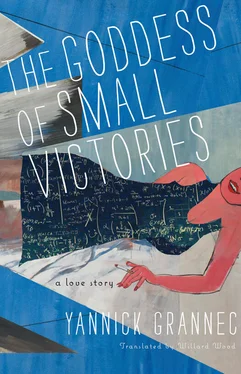“He isn’t completely wrong! What about you, Adele, how are you settling in to Princeton?”
“I miss Vienna. Princeton is very provincial. The people look at me oddly because of my accent.”
“It’s easier to break an atom than to break a prejudice. They even arrested the son of my friend von Laue, who was just sailing his boat. They suspected him of sending signals to enemy submarines! Someone had denounced him to the authorities because of his accent.”
“My wife refuses to take an English course.”
“I don’t have time.”
“If you hadn’t fired the housekeeper, you would have time.”
I said nothing. I’d had to get rid of the cleaning lady because I suspected her of stealing. To be frank, I could never quite get used to the idea of having someone work for me, but I was embarrassed to spell out for them what I knew to be a working-class reflex.
“The two of you are restless. You keep moving house.”
“Here Kurt is closer to the Institute. We’re just a few steps from the train station. He chose this apartment because it has windows on both sides. We can cross-ventilate.”
“I’ve noticed that! Even I am cold, Gödel. Close the windows!”
My husband rose unwillingly.
“How do you pass the days?”
“I do the housework, I go to the movies, I prepare food for Kurt that he won’t eat. I knit things for the Red Cross.”
“You take part in the war effort.”
“I do next to nothing. It’s just something to keep my hands busy so that I won’t think too much.”
At this point, Pauli started playing with his bread. Our guests were getting bored.
“Don’t worry, this damned war is winding down. The Allied forces entered Germany in September. It’s only a question of months now.”
“We can do nothing but wait. Perhaps we should start knitting as well, eh Gödel?”
“I prefer to focus on my own research, Herr Einstein.”
Our Viennese guest smiled — through his mind had flashed the same image as through mine, of a logician struggling with his knitting needles.
“What idiocy to pass up the use of your two brains on the pretext that your passports are German!”
“What? They suspect Herr Einstein of spying for the Nazis?”
“Dear little lady, the Department of Defense suspects me of being a Socialist, not to say a Communist, which, to their way of thinking, is a kind of contagious disease. In their great generosity, they have authorized me to make ballistics calculations for the Coast Guard with my old friend Gamow.”
My husband’s eyes widened in fear. “You shouldn’t speak so openly, Herr Einstein. We are probably under surveillance.”
“Let them watch me! I auctioned off my original manuscript on special relativity and gave them six million dollars! Hitler hates me more than he hates his own mother. I personally wrote to Roosevelt to alert him to the urgent need for nuclear research. And now they suspect me? How ironic!”
“Keep your voice down!”
“What can they do to me, Gödel?”
“You could be kidnapped by enemy agents. Have you ever thought of that?”
Einstein slapped his thigh as though it were the best joke.
“You should write spy novels! Watched as closely as I am? I can’t have prostate problems without J. Edgar Hoover hearing about it! They are much too frightened of having me speak out publicly against the use of this damned bomb! Roosevelt’s reelection reassures me only slightly.”
“Nothing indicates that nuclear technology will be ready anytime soon.”
“Dear Gödel, your naïveté is a delightful ray of sunshine. Believe me, it is ready! You haven’t felt a little lonely in Princeton recently? The army has called up Institute members of every shoe size. Oppenheimer has disappeared from view. Von Neumann only breezes through occasionally. You don’t need to be a genius to guess what they are doing! There’s nothing like a good little war to give technology a push.”
“Military supremacy is what will guarantee peace.”
“I don’t share your optimism, Pauli. The very concept of dissuasion goes against the military mind-set. I distrust anyone who likes to join a column and walk to music. Brains were given to the military by mistake, a spinal cord was really all they needed. Keep them from using a new toy? Might as well try leaving a wrapped Christmas present under the tree!”
“You prompted the research in the first place.”
“At the cost of great violence to my inner self! I am a committed pacifist. The horrible reports that have come from Europe forced me to rethink. If Hitler had that bomb, there would be no one to keep him from using it.”
Pauli was sculpting his bread ball, which by now had turned gray, with the tip of his knife.
“That madman has made every useful scientist take to his heels. By persecuting Jewish science, he has sawed off the rotten branch on which he was sitting.”
“You’re frightening my wife, Herr Einstein. All these horrors will soon be behind us.”
Albert wiped his mouth and patted his stomach before tossing his napkin onto the table.
“Never in the course of modern civilization have we had such a black future. Other conflicts will arise, war is mankind’s cancer.”
The men were quiet. My eyes were full of tears. “The war will soon be over,” that was all I could hear. When it ended, I could go home. Pauli set down in front of him the figure sculpted from bread. He stuck a little disk of wax that he had picked from the tablecloth behind its head: Saint Einstein, the patron saint of pessimists. His model smiled.
“I’m so sorry, dear Adele, I quickly get carried away. What have you planned for dessert?”
“Sacher torte.”
“Mazel tov! May I have your permission to light my pipe? This old friend of mine sweetens my thoughts.”
I went back into the kitchen. Tears welled up in my eyes in spite of myself. The men probably thought I was worried about the fate of mankind, but in fact I was feeling a wave of self-pity. I was a child in a world of adults. Their universe was not accessible to me: it couldn’t be explained with a simple drawing in the sand or a few pebbles in a line. I didn’t have the words, so I cried. I cried about my loneliness. My bad English kept me enclosed in a perpetual fog. At one point I’d hoped that by associating with my countrymen I could bring light into this dark and blurry world. I was still lost. No naturalization into their scientific country was possible, there were only natives. All the same, I tried. I read a little, I paid attention. But every time I pulled on a thread, it just led to another. The weave was too dense, the fabric too big to be encompassed by the little dancer. I would never be from here; I would always be an exile in the midst of these geniuses. I was reaching an age where men would be more charmed by my cooking than my legs: the age of resignation. I wasn’t ready to give up — far from it.
Professor Einstein spluttered a few crumbs of cake toward my husband, who was cautiously sipping his hot water.
“How is your friend Morgenstern? I thought I would see him here tonight.”
“He is preparing the publication of his book with von Neumann. 15And von Neumann has hardly been seen recently.”
“He’s much too busy playing with neutrons.”
“Is there anything von Neumann doesn’t take an interest in? The man is a menace. He never stops. And he is as fast at drinking as he is at calculating!”
“He is Hungarian, Herr Einstein.”
I was bored. I’d heard them yammer on about von Neumann’s eccentricities already. He had the reputation for being quite a practical joker. One day when Einstein was supposed to go to New York, von Neumann had offered to accompany him to the station. On the way there, he told him one funny story after another. The elderly physicist boarded the train crying with laughter, only to realize later that he had been deliberately put on the wrong train. According to Kurt, von Neumann was a terrible example to the students. Some of them thought that, like him, they could spend the night drinking in clubs and then go straight to their early-morning courses as fresh as ever. But von Neumann was not human. Kurt was especially appalled by the amount of food the Hungarian could put away. His hyperactivity exhausted my husband before the fact. I had met him at the house of our former neighbor on Stockton Street, Mrs. Brown. She was drawing the illustrations for the book he was coauthoring, Theory of Games and Economic Behavior . I looked after her baby; John looked after Mrs. Brown. His appetite knew no bounds. Kurt had explained to me that he and Morgenstern described social and economic phenomena using games of strategy such as Kriegspiel. That all these gray cells should be assigned to military projects struck Kurt as a great shame. Meanwhile, the von Neumanns had a very pretty house in Princeton. John was a consultant for the U.S. Navy, and the military paid well.
Читать дальше












